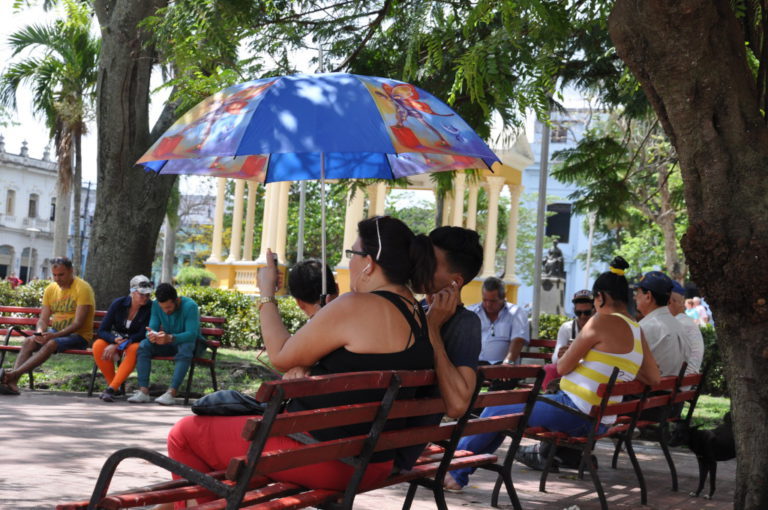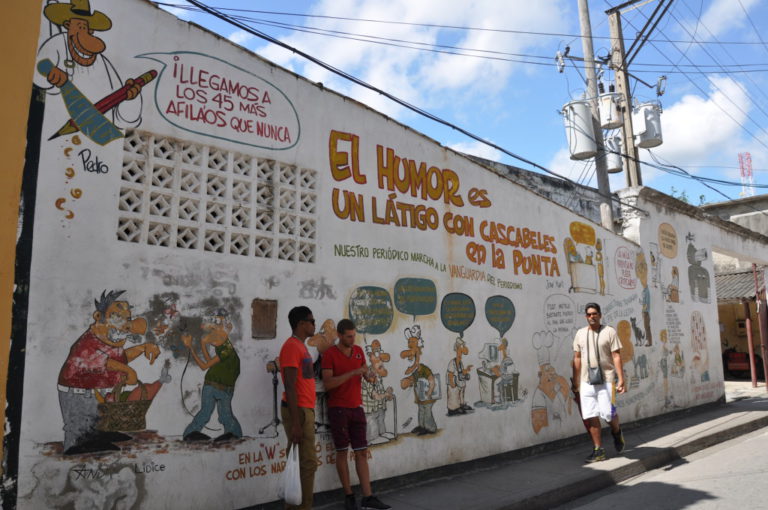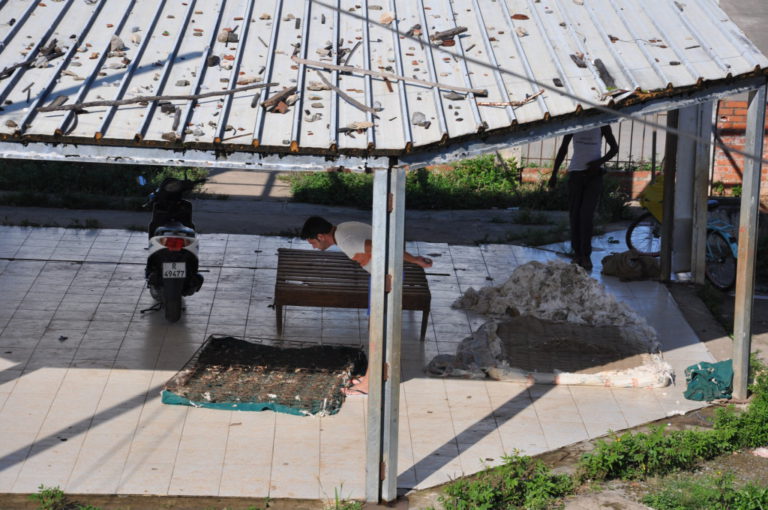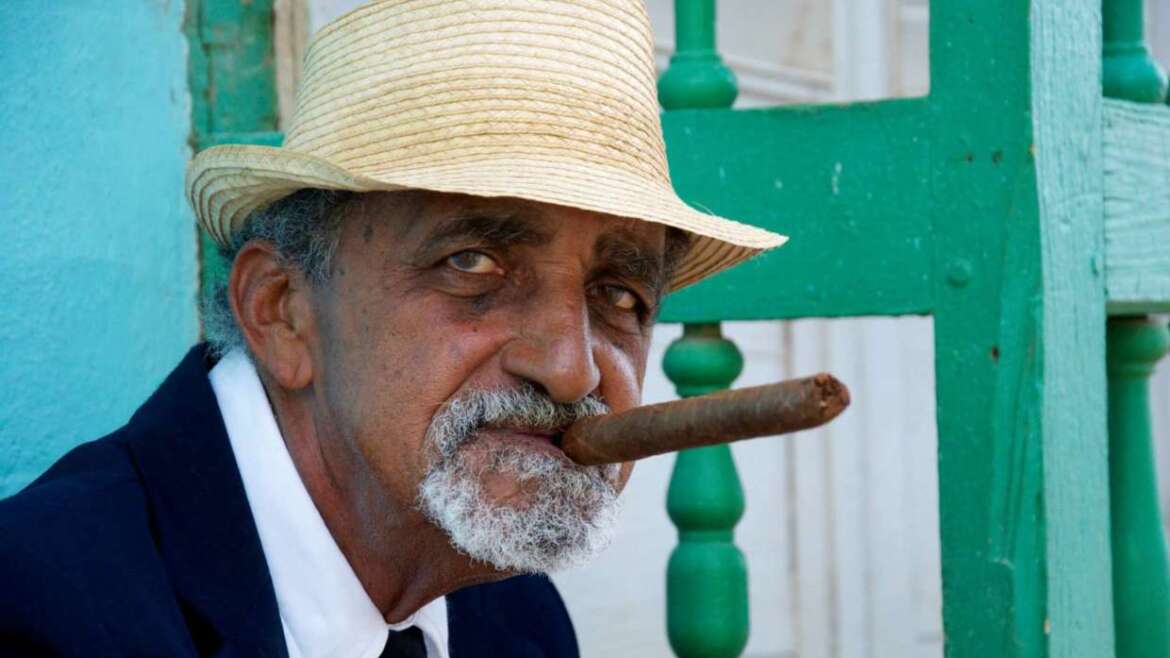Contents
Unexpectedly, Cuba has become my second home. During the day, in endless queues for everything, I lose my patience. In the evening, with a glass of mojito and salsa, I forget what is wrong. A difficult life, full of absurdities, which is carefully hidden in front of tourists, that’s the real Cuba.
We are in the kitchen above the only available stove. Red kidney beans are rejuvenated in the pot, and I tell you how induction works. – The plate knows when to heat the pot, and if you touch it, it’s cold. Rolando and Odalys, his mother, listen and pay attention with open eyes; because the Cuban kitchen sounds like a science fiction movie. A few days after my arrival, we went shopping to fill the fridge. I had a long list in my head. I wanted to buy watermelon, pineapple, pumpkin, peppers, tomatoes, cucumbers, ripe bananas – for frying – and green plantains (green) – suitable for cooking. Nothing more, I don’t eat meat, so fruits and vegetables are always on the menu. The store had watermelons and sweet potatoes. Nothing else, step by step I began to understand what I should have known, that is often repeated: “It is Cuba”, on the lips of Cubans. I live here so I fight for any food other than rice and beans; this is on my daily plan list for the day. Here nobody thinks about the induction stove, but eating, they do, everyone and every day.
Every time, when there is nothing in the stores or when there is no vendor or dinner in Restaurants lasts an hour or when the post office is closed because the computer doesn’t work, we always hear “It is Cuba”. Cubans see tourists dressed differently with electronics and an expensive wallet that allows them to have diner in a restaurant. They see their neighbours emigrate to the United States and Europe and also see that something went wrong. Socialism allows you to sit in a rocking chair for many hours a day, but the desire to experience at least a little better life is sought in every home.
Two different Cuba in One Island
A store with watermelons and potatoes is a state store; like most shops, bars and institutions in Cuba. I call these stores “markets with nothing” or stores with nothing. Nobody thinks here in customer service or assorted merchandise. We buy what is available and the most important is that we buy with pesos; because Cuba has two currencies and two worlds. The Cuban peso is the National currency. And freely convertible currency or USD is a currency for tourists. For £ 1 or (equal to 1 dollar) we will buy the equivalence of 24 Cuban pesos. The difference is huge. It is the same that happens between the world of Cubans and the world that Cuba offers to tourists.
Foreigners can pay in pesos only in selected locations; more often for fruits that are selling on the street. But the colourful cars, private markets or private shops, we can also settle in USD or euro. If we are tourists in Cuba, it is better not to think that we will save money. Either in pesos, USD or Euro we will always be duly counted. Oh, usually in the state stores, the vendor rounds the price for us, and when they see we’re not so naive, with a smile on her lips, she’ll say she just doesn’t have any change. Just.
Cubans can count on. The whole Island is a great system based on commission. Tourists who visit the hot Island usually overnight in private houses, that is to say, private houses with the appropriate license and guest rooms. Rooms always count with air conditioning and a private bathroom as well as clean towels and an exotic welcome fruit cocktail. The hosts will ask us to organize trips, excursions in the area, help with local guides or accommodation in other cities. They will contact whoever they need and we will see, and everything will be done. The tourist loses nothing: the cost of the order is on the beneficiary. Direct contacts are a rarity because there will always be an intermediary who will want to organize something. If Cubans want to earn money on tourists, they must abide by this network of systems and contacts. Leaving the line is not welcome.
The problem of building a house, renovating an apartment, buying fuel or eating is similar. Everyone knows someone who works at the right institution to do something. For example, cement in housing, the real state office responsible for building materials, and if you are in a State restaurant you will see that employees sell under the table. If we know the driver of the school bus, we will get cheaper fuel and that way, successively. My generation doesn’t do it, but the previous one perfectly remembers those “arrangements” from former Poland.
What is the real Cuba?
It is Wednesday. Today, at the guesthouse of Rolando and Odalys, there are tourists from Germany. They were very surprised when they find out I was from Poland. And they asked, are you really Polish? Are you a hundred per cent? Are the parents too? Because you know … you don’t look like a Polish woman, they were shocked during the dinner. They wanted to have dinner at home, a tastier and cheaper solution than a restaurant because they wanted to see how Cubans eat. What is the real Cuba? The thing is that breakfasts or dinners prepared for tourists have nothing to do with the real Cuba. For breakfast in private houses, we almost always have the same. To drink, fresh fruit smoothies and coffee with milk are prepared in separate thermos. Hot milk is always powdered milk, but Cuban coffee is absolutely delicious. They have fruits, white bread (another is not possible to find in Cuba) and eggs obligatory; very often in an omelette, or our omelette. Sometimes there will also be cheese slices and sausages on the table, guava jam and butter. Everything very well set awaits uniformly the guests.
Cubans for breakfast eat half of the same bread, but not cut into slices, but in the form of a large baguette or a bread roll. In the middle, an egg (omelette) is fried in oil. Everything else that is set on the table for tourists is waiting for them and other things in the refrigerator are intended only for tourists. Cubans don’t eat butter, cheese, or fresh fruit every day. It is simply too expensive for them, but then we will have the profit.
Dinner for tourists is also an ideal table. Plates and cutlery are waiting. The guests ask for chicken or fish. On the table, there will be a bowl with beans, a plate of rice, fresh vegetables, sometimes fried plantains and, finally, a surprise: a dessert made of fruit or flan. What will the Cuban eat? Rice and beans and sometimes pork chops, but mostly egg. Sometimes they eat something like fried sausages or some kind of ham, a sausage similar to mortadella that is sold in Europe; but fresh vegetables or too expensive meat? Meat is too expensive and the basic difference – the way of eating. Cubans eat everything on a deep plate, mainly with a spoon and not on the table, but in a rocking chair. As a vegetarian, I am truly curious about them. How can you just refuse to eat the most desirable food? Curiously, in-state restaurants you can only choose meat dishes. Interesting, because the meat is hard to find, but the vegetarian dishes are even more difficult.
Free food and ration card food?
Poland did not experience ration stores with cards, so let’s catch up in Cuba. Each month, every person only has the right to rice (3.5 kilos), sugar (1 kilo for 6 people), beans (1 kg for 6 people), oil (250 ml per person), coffee (115 grams per person), salt (1 kg per family), eggs (5 per person per month), sometimes ham, chicken or fish. And there is one more thing that many Poles dream about. Every morning a person of the neighbours knocks on the door and delivers bread rolls directly from the bakery; one state bread for each member of the home. It cost monthly about 2 USD or euros – for the bread along with the commission for the person of the neighbour. Is this enough food allowance for a month? It is not, of course. You have to earn to pay for the rest.
A Cuban who works in a state institution earns around 14 USD per month (approximately 12 euros and, as a social welfare state, the second 14 USD are received for dinners. Before, lunches were served in factories, but today Fidel’s state reduces costs. Every Cuban has to work for two or three years in an office of the state administration. In addition, men have a mandatory two-year in the army. The lucky merchants are those who make money with tourists, that is, they earn in USD.
Does the one with the $14 USD earned and the monthly food allowance is living with enough for a life worth? He doesn’t, of course of not, even in a socialist state. Emanuel is 23 years old, he works in a state institution, but in the late afternoon or dark dawn, he trades food difficult to find. And from door to door, he knocks with fresh fish and bottles of natural yoghurt of 1.5 litres; a rarity for the whole family. When such a bottle appears in the refrigerator, everyone shares it equally and all observe their portion. It is not known when it will appear again. What Cubans say: everything is possible in Cuba and nothing is certain. For Emanuel, this is a way to make a modest state salary. When we meet at the Casa de la Música at night (in every city there is a state sanctuary with an arts program every night), Emanuel drinks rum dressed in a snow-white shirt. Today he doesn’t trade, he rests. He asked me- How can I say in English: Do you want to dance? – He asked shyly. He liked one of the tourists. There are already many of these international couples in Cuba, but men have more chances to conquer other nationalities.

A challenging and hot Island!
Cubans are famous for their promiscuity. They love tight and challenging clothing, lots of jewellery and strong makeup. They are dominant and temperamental; when they have a relationship, formal or not, they often have someone by their side. Men do not remain in debt and, as a result, we have a society marked by patchwork families. The traditional family model is a rarity. At first, you manoeuvre in this maze of betrayals, romances, divorces and half-sisters, but then subsequently, each story taken out from the Brazilian TV novels does not surprise us absolutely.
I pulled up all my shorts at least twice. They were too long for short pants in Cuba. When I saw a woman in long dresses today at Casa de la Música, I knew they were from the stores for Cubans. Here everything is very short and the shapes must be highlighted. There is nothing to hide in the Latin world; a belly, bacon? It doesn’t matter. Everything has to be shown. Nobody thinks even in hiding the deficiencies.
And dressing in Cuba is not easy. Although the choice of clothing in Havana is considerable good, it is not present in smaller cities. Cubans usually buy clothes imported from Panama or Ecuador by people who have visas and passports. Again, trade takes place in the houses. A few days ago, Alejandro brought blue sneakers from Ecuador. Price 8 USD; is divided into two hours. Cosmetics are also luxurious; every bottle or jar of cream left by tourists is worth its weight in gold. Most cannot afford toilet paper. Firstly, barely it may be available; secondly, its price is inadequate for the revenues.
The door is open
Cuba is not about anonymity, privacy and taboos. None announces its visit, but everyone goes from door to door with their own affairs. In the end, there is always something to do and there is always someone who will help you to do it, except by taking the official path. The houses are full of traditional rocking chairs. While an average person sits in their life for 17 years, I think the average Cuban can calmly do it for 27 years. The silence lasts from midnight to 8 am and nobody here is surprised by the guests returning at 22 or 23 hours. There is no tradition of drinking cocktails, much less of eating. People just sit and talks about everything and nothing. The only taboo subject is politics. – It is better to know less and speak less even because the walls have ears, the Cubans say. They know very well that there are many agents among them. There is also a lack of police intervention,
– In Cuba you cannot have a job for half a year and to live in peace – says Daniel, a taxi driver. None is indifferent to another human being here. When you run out of rice, you can always have a neighbour. But Daniel met a neighbour who closed his second divorce and, like most Cubans, he wanted to leave the country.
When Grandma Rogelia was ill, it happened that after an antibiotic she had to go to the next city; about thirty people passed by the house. Everyone was concerned and interested in the health of Abuelita (The Spanish word for grandmother). Cuban medical assistance is insured, but drugs can be difficult. When I wanted to buy something for coughing, after standing in a long line out in a state pharmacy (not personally, because foreigners cannot buy there), it happened that there was nothing to medicate the cough; next door, at the tourist pharmacy, without any queues, myself personally bought a syrup for 5 USD (about 3.50 Euro). The Cuban will find ten homemade throat solutions faster than paying for the medicine.
When the grandmother is healthy, she spends the whole day at home for the elderly (Nursing house). For a little fee each month, the company of colleagues, medical care and five meals are provided from Monday to Friday. The grandmothers always talk, grandfathers play dominoes. It is an idyll. But not everyone is passing old age like that. Like everything here, also appropriate contacts are needed, that is to say, many conversations with everyone. – How can you sit all day and babble about nothing? – I asked one day, upset for the constant visits of the neighbours. – And sit all day in front of the computer is it better? – I’ll hear answers.

Collective car
The most famous old men in Cuba are American cars. Those a little bit younger and in good conditions are used for tourist excursions. But these we are talking about have been renewed countless times; they are exploited as collective cars, or taxis to share with other people. While going between cities, a car like these will not move until it is full of people. In Havana, they drive on fixed routes and passengers take a taxi on the street and travel with others. Private taxis are popular only among tourists.
Buses – City or intercity buses are even cheaper. Recently when I returned from Havana, at the station, I checked my passport to buy a bus ticket and they sent me a receipt. For foreigners, there are Viazul buses, about 10 times more expensive and there is no discussion. And although, in theory, we should not find Cubans in those busses, of course, when there are vacant seats, there will be friends of the driver. Nobody here does empty racings.
The road to capitalism
Cubans are entrepreneurs. Taught to combine and live in a country where it is not much, they do good use of the twists and turns of the capitalism that appears on the Island. But as they can work on their own, they are thinking more about money and less about relationships. They draw a full handful of the western lifestyle. In the end, Miami is less than 200 km by the ocean.
Last year, Cuba received the record of the visit of two million tourists and the trend is growing. Every time I come here, I see new restaurants and attractions for tourists. Live music is heard in bars and on the streets. But in the houses too; it is enough for the Cubans to listen to hot rhythms and they jump straight into salsa. Changes are visible from month to month, but they are slow. Like the time in Cuba. Here, 10 minutes can last one hour or two. But since Wi-Fi has appeared in cities, Cubans know better how long an hour lasts. They pay 2 USD for every hour of internet connection. To have internet, we first need a scratch card with login and password. Places with Wi-Fi are recognized by groups of people with smartphones looking at their screens; most of the time these places are parks or major squares of individual cities. Those who have computers at home can watch movies and series that are sold in USB drivers, that is to say, the so-called packages distributed every week. It is internet information without internet, with materials from the United States. In Poland and Europe, we say “Polo can”. Cubans think exactly the same of themselves.
Unreal utopia
On the highway that crosses Cuba from east to west, posters with mentions from Fidel Castro appear from time to time; one of them that praised socialism is: “A better world is possible.” Because in fact, Fidel wanted to do it well. He wanted to create a utopia. A state without divisions: equality and justice for all the citizens; free education and health care, state jobs for everyone, state stores and cards for basic products. In the houses, there will not be a shortage of water or electricity, and the bills won’t be short. Nobody will starve. Everywhere should be clean and safe. Nowadays, people, even if they get richer, they don’t have much to grow in consumerism. Could you want something else? Yes, I could, for example, have freedom. There was no any Cuban who did not come out of the Island with a 100 USD passport.
The reception of Cuba across the west, with stores full of things we do not need, is distorted. In fact, and despite appearances, Cuba thinks about ecology and economics. It is the only country that pursues its objectives in the field of sustainable and ecological development. Also, Cuba has the best-preserved ecosystems in the Caribbean. When we buy things from a predetermined date of use, Cubans are taught to respect everything and what has been broken, must be fixed.

Tomorrow there will be a new mattress on the bed – says Odalys, and I? I didn’t hide it, I was very happy with that message. The next day, early in the morning, I heard – Barbara! Stand up! We need the mattress! No! I looked back and outside the window, on an old bed, I saw two men and my mattress that was being taken apart to accommodate the padding and seams. – Would you be in Europe throwing away and buying new? – Rolando asked. “Yes”, I answered surprised by the “new mattress “. Repairing – 25 USD. The new one cost 300.
In shops, banks and offices, I bite my tongue every time, not to say “is anyone working here”? But then I think: is it betters the capitalist world of overtime, the career of rats, unhealthy ambitions and the constant race for success? Perhaps it was Cuba that resisted capitalism and corporate slavery that chosen a better path to the future and social justice? Fidel Castro said in his defence speech that history will absolve him. The answer to this question is also known only for the story that comes.

